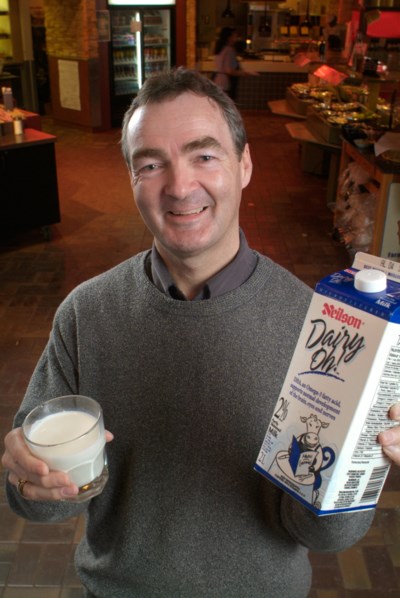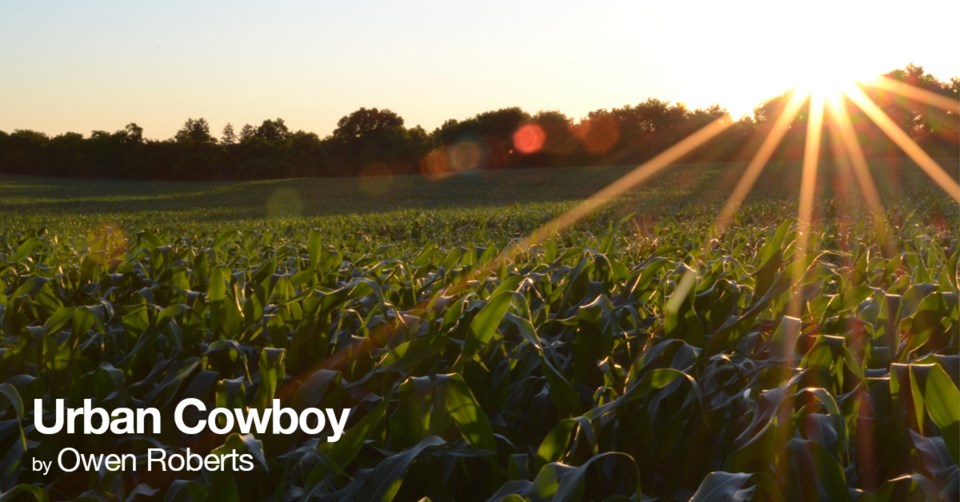I play guitar, a conventional big-bodied acoustic dreadnought, and I usually play it in standard tuning. When I do, I sometimes think of my guitar-playing buddy Brian McBride.
Unlike me, he seldom plays in standard tuning. “Owen, you should really try some open tunings,” he says in his encouraging way. And I know he’s right — it’s good to experiment with sound and fingering, and open tunings can be fun.
So can guitars, other than awesome-sounding and playing dreadnaughts. Deeming such acoustics too cumbersome to drape himself around for his precise bluesy, fingerpicking style, he chose more compact parlour guitars.
Then, he honed his preferences even further, focussing his collection on classic 1930s era parlour guitars. He knows those guitars inside out; they were popular during the era of music he likes the best.
 Brian McBride, inventor of Dairy Oh! milk.
Brian McBride, inventor of Dairy Oh! milk. I think about Brian too, when I see Dairy Oh! milk in the dairy case. That’s because in his daily life as a livestock nutritionist and researcher at the University of Guelph, he and two colleagues invented Dairy Oh!.
His understanding of a dairy cow’s inner workings helped he and fellow animal bioscience researcher Tom Wright and nutritional science pioneer Bruce Holub figure out a way to enrich dairy cows’ milk with DHA.
DHA is one of those essential Omega-3 fatty acids we are chronically short of. They help prevent cardiovascular disease and encourage neurological development. Dairy Oh! milk helps close the gap; it provides one-third to one-fifth of our daily requirements.
Consumers have embraced Dairy Oh! It’s become one of the top brand-identified products ever in Ontario dairy, introduced at a time when dairy products were almost all generic. Dairy Oh! is also one of the most commercially successful products to ever come out of the University of Guelph, Canada’s food university.
It’s not only dairy cows that have benefited from Brian’s expertise. Brian helped introduce a disease-detecting technology called a telemetric bolus he and his colleague Ousama Alzahal developed to solve digestive problems in dairy cows to two world-famous wildlife establishments, for giant eland.
Today, friends and colleagues are saying thanks to Brian for more than three decades of service to the university, to the Ontario Agricultural College, to the agri-food sector in Ontario and to the global animal health sector.
At a recognition event at the Delta Hotel and Conference Centre, he’ll be lauded for having authored more than 300 peer reviewed papers, and for receiving an NSERC Discovery Grant for 32 consecutive years (1985-2017) with $8.9 million in total grant awards.
It will be noted that Brian’s advised 40 MSc and 20 PhD students and conducted research funded through the United Nations Food and Agriculture Organization and the Rockefeller Foundation. His work there has led to the local development of nutritional supplements for grazing animals in Tanzania, using locally mined rock phosphate in Kenya. These nutritional strategies are still in use by small holder farmers in East Africa.
Fortunately, we haven’t seen the last of Brian. He’s been nominated for professor emeritus status in the Department of Animal Biosciences.
That’s great. But I’m waiting for him to come out of the woodshed with one of those parlour guitars, and treat us to a solo album of roots blues music.
After all, he’s pretty well done everything else.
